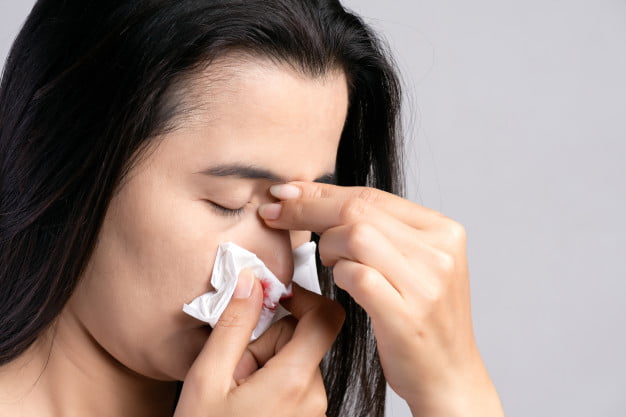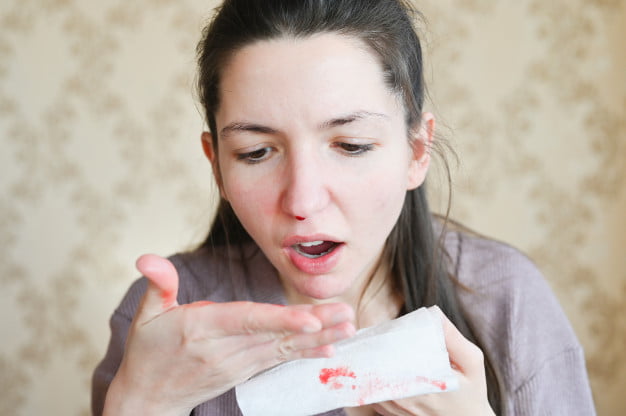
Winter is a challenging season for noses, particularly in areas that experience frigid temperatures. As you find yourself transitioning frequently between the bitter cold outdoors and the dry, heated air indoors, your nose is more likely to dry out. Along with the sniffles of winter and stuffy noses as a result of flu and cold viruses, this adds up to a recipe for a greater likelihood of nosebleeds. Also known as epistaxis, a nosebleed can generally be stopped without seeking medical help.
What is a Winter Nosebleed?
A winter nosebleed is generally caused by low humidity, which is present both in indoor heated air and outdoor cold air. This dryness to the air dries out the delicate membrane which lines the nasal passages, causing it to crack. Afterward, a single sneeze, cough, sharp fingernail, or even blowing your nose can rupture the tiny blood vessels dwelling just beneath the surface. The nose boasts a wealth of these small blood vessels.
Nosebleeds may occur at either the front or the back of the nose. The former is known as an anterior bleed, while the latter is called a posterior bleed. While winter nosebleeds may occur in anyone, these fairly common occurrences are still more likely in adults between the ages of 50 and 80. While the initial cause of a nosebleed may be the dry air indoors and outside, some typical triggers may cause recurring bleeds. These include medications such as blood thinners, allergies, infections, and picking or blowing the nose.
Some factors can make winter nosebleeds more likely in the first place. These include infection, trauma, allergic rhinitis, non-allergic rhinitis, high blood pressure, overuse of alcohol, hormonal changes taking place during pregnancy, tumors, and hereditary bleeding problems.
Winter Nosebleed Treatment:
Regardless of the cause, the directions for stopping a nosebleed remain the same. First, do not panic. Sit upright, leaning slightly forward. This prevents blood from flowing down the throat. With your index finger and thumb, hold the nose at the soft part in a firm pinch. Continue this for a minimum of ten minutes. You may need to repeat the process. Do so as many times as you must until your nose stops bleeding. If any is available, use a decongestant nasal spray to assist in stopping the bleeding more rapidly. An ice pack placed across your nose at the bridge can also be of use.
When you have a nosebleed, avoid leaning back. Neither should you tilt your head back. These permit blood to flow back into your throat and sinuses. You may then gag on the blood, or inhale some of it. Do not lie flat, but keep your head above the level of your heart. If blood collects in your throat or mouth, spit it out. If swallowed, it may cause you to become nauseated, vomit, or suffer from diarrhea. You may need to gently expel blood clots from your nose by carefully blowing it. This may worsen the nosebleed to a slight degree, but it is temporary and to be expected.
Sit quietly while waiting for the nosebleed to pass. Breathe through your mouth as you press the pinched part of your nose against your face’s bones. After it has passed, use ice that is wrapped in a towel on your cheeks and nose. Do not stuff tissue or cotton into your nose, although it may be tempting.
Preventing Winter Nosebleeds:
An excellent tool for fighting the likelihood of a winter nosebleed is a humidifier, particularly in your bedroom. Run it with your bedroom door closed several hours before you retire for the night. This builds up the moisture in the air so that the eight or so hours of sleep you spend there is as restful for your nose as it is for you. You can also apply petroleum jelly to add moisture to your nose. Apply a dab to each side of your septum twice a day. You can also use saline gel on the inner part of your nostrils; this is another means of moistening the lining of the nose.
While staying hydrated is important year-round, it is particularly important in the winter months if you wish to avoid winter nosebleeds. Try to consume six to eight glasses of water daily. Try to avoid sneezing, but if you need to, do so with an open mouth. This lowers the pressure present in your nose. Avoid bending over, particularly to lift heavy objects. Limit strenuous activities; vigorous exercise and heavy lifting increase pressure in the head. Avoid straining while having a bowel movement. If necessary, use a stool softener to make the process less strenuous.
After a nosebleed, rest with your head elevated between 30 and 45 degrees. Do not put anything in your nose. Avoid hot liquids for a minimum of 24 hours. Instead, eat a diet consisting of cool, soft foods and beverages. Do not take blood-thinning medications; this includes aspirin and ibuprofen. Consult your doctor, however, before ceasing medications. Your doctor might recommend a different lubricating ointment to use inside your nose.
When to Seek Medical Help:
If the bleeding will not stop, if blood is lost in large amounts, or if you feel faint or weak, consult a doctor. Chronic or persistent nosebleeds may require attention. This can take the form of a chemical swab or heating instrument to cauterize the problematic blood vessel or vessels. A medication for topical use can promote local blood clotting. A doctor may also use nasal packs when other measures fail to work in stopping nosebleeds.
At an office visit, such as at your ENT doctor in Philadelphia PA, tests may include nasal endoscopy, CT scan of the sinuses and nose, a complete blood count, and measurements of partial thromboplastin time, or PTT. This latter test measures how long blood takes to clot. With a physician’s help if necessary, and precautions at home, treatment, and prevention of winter nosebleeds are fairly simple.
Read Also:
- 5 Tips For Staying Healthy This Winter
- When to Consult a Psychic
- Best Tips to stay healthy When Talking to Your Doctor During a Check-up
- 5 Exercises To Help Improve Your Heart Muscles And Condition





























